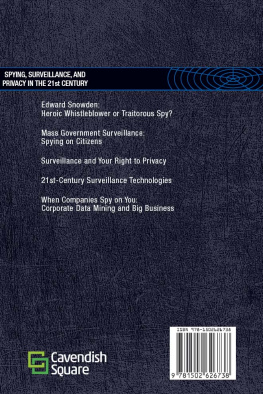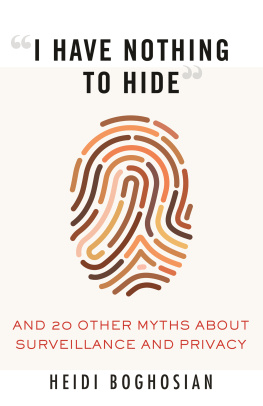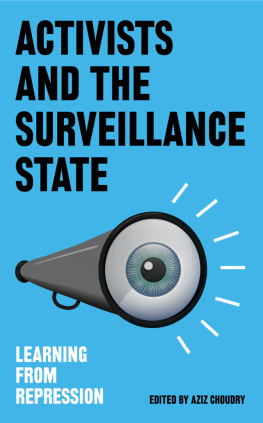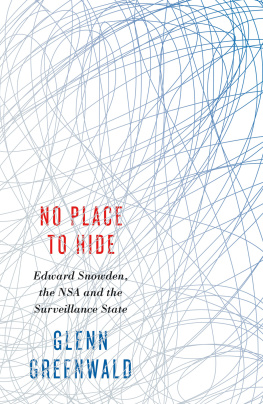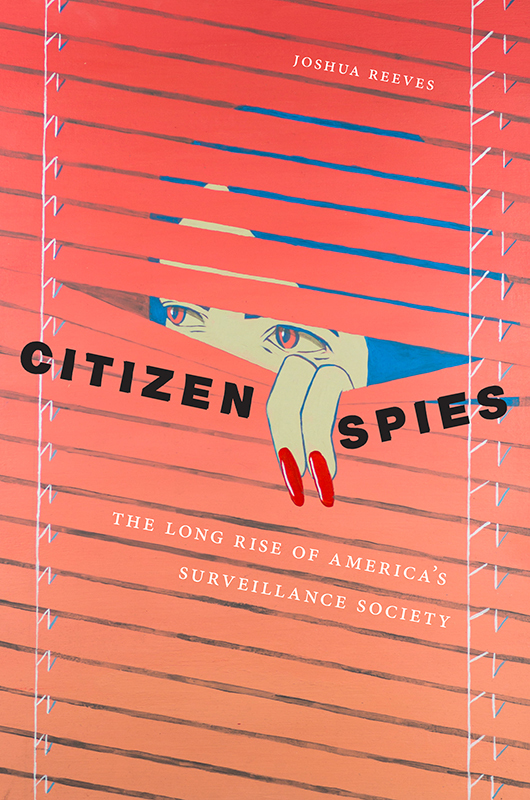
Citizen Spies
Citizen Spies
The Long Rise of Americas Surveillance Society
Joshua Reeves

NEW YORK UNIVERSITY PRESS
New York
NEW YORK UNIVERSITY PRESS
New York
www.nyupress.org
2017 by New York University
All rights reserved
References to Internet websites (URLs) were accurate at the time of writing.
Neither the author nor New York University Press is responsible for URLs that
may have expired or changed since the manuscript was prepared.
ISBN : 978-1-4798-0392-7
For Library of Congress Cataloging-in-Publication data, please contact the Library of Congress.
New York University Press books are printed on acid-free paper,
and their binding materials are chosen for strength and durability.
We strive to use environmentally responsible suppliers and materials
to the greatest extent possible in publishing our books.
Manufactured in the United States of America
10 9 8 7 6 5 4 3 2 1
Also available as an ebook
Contents
My friend and mentor Hans Kellner once told me that academic debts are many and varied, and over the years Ive learned that he was certainly right. Many people have helped me along the path to this book: above all, Jeremy Packer has been a constant source of creativity and guidance. I am also enormously grateful for the generosity displayed by Chris Ingraham, Matt May, and Ethan Stoneman as they endured years of exhausting monologues on surveillance, communication, rhetoric, and violence. I owe special thanks to Mark Andrejevic, Vicki Gallagher, and Hans Kellner for their encouragement and guidance while this project was in its infancy. All of my colleagues at the University of Memphisespecially Tony de Velasco, Patrick Dillon, Leroy Dorsey, Joy Goldsmith, Rika Hudson, Marina Levina, and Camisha Smithhelped keep me sane and happy while this book took shape between 2013 and 2015. The ILL staff at the University of Memphis proved to be tremendous sleuths who repeatedly impressed me with their tenacity and success. I would also like to thank my old pal Adam Chandler of Cornell University Library for tracking down a number of archival documents that were crucial to this project. My anonymous reviewers were incredibly generous and insightful, and I couldnt be more grateful for the challenges they set before me. Thanks, as well, to the staff at NYU Press, especially Alicia Nadkarni; its been a wild and joyful three years. And to all the friends whose work I learn from and whose company I enjoyfolks like Carole Blair, Jack Bratich, Fernanda Duarte, Rachel Dubrofsky, Dan Faltesek, David Gruber, Rachel Hall, Colin Hesse, Nate Hulsey, Jason Kalin, Ashley Kelly, Kelsy Kretschmer, Kate Maddalena, Torin Monahan, Alex Monea, Ned OGorman, Kathy Oswald, Ehren Pflugfelder, Chris Russill, Dawn Shepherd, Dan Sutko, and Ken Zagacki, just to name a fewI look forward to whatever comes next. To my new friends in the College of Liberal Arts at Oregon State Universityespecially Krystal Canales, Loril Chandler, Sally Gallagher, Lee Ann Garrison, Trischa Goodnow, Jeff Hale, Robert Iltis, Todd Kesterson, Bill Loges, Katrina Machorro, Elizabeth Root, Kim Rossi, Marion Rossi, and Gregg WalkerI would like to say thanks for making this such an interesting place to be. And finally: thanks to Surveillance & Society for providing an outlet for the very earliest iterations of this work. Small parts of the Introduction and Chapter One previously appeared in If You See Something, Say Something: Lateral Surveillance and the Uses of Responsibility, Surveillance & Society 10.3/4 (2012): 23548.
I should also thank the U.S. Department of Homeland Security, which has trademarked the original title for this book (If You See Something, Say Something) and thus forced us to come up with a new title at the last minute. I like this one much better. And thanks, above all, for providing such a clear illustration of one of the books main themes: how the state regulates the communicative conduct of its citizens.
Fortunately, my personal debts are just as many and varied as my academic ones. Although I cannot begin to list them all here, at the very least I should thank all the family and friends who were sidelined during the years I worked on this book. Finally, my wife Leslie deserves the most credit of all. This booklike so many other things I work for and enjoywould be impossible without her. So it is to Leslie, as well as to Austin, Annelie, Amelia, and Oliver, that I dedicate this book.
Seeing, Saying, and Civic Responsibility
When Neighborhood Watch volunteer George Zimmerman was acquitted for the murder of Trayvon Martin, public discourse was flooded with reflections on what the verdict said about America in the twenty-first century. Millions of Americans traced Martins deathand then, Zimmermans acquittalto the nations enduring legacy of racist violence. Anthea Butler, a professor at the University of Pennsylvania, stirred up controversy by remarking, When George Zimmerman told Sean Hannity that it was Gods will that he shot and killed Trayvon Martin, he was diving right into what most good conservative Christians in America think right now. Whatever makes them protected, safe, and secure is worth it at the expense of the black and brown people they fear. the Trayvon affair was an explosive symptom of structural racism in the United States. From their point of view, Zimmermans appeals to self-defense and neighborhood security simply rationalized interracial suspicion and increased the likelihood of further violence against marginalized groups.
Many Americans, however, had a different take on the Trayvon tragedy. For instance, rightwing activist and southern rock icon Ted Nugent praised the verdict, arguing that Zimmerman simply displayed the fundamental responsibility of a neighbor who cares. For Nugent and other champions of Zimmermans brand of vigilant citizenship, Trayvon Martins death was a simple malfunction of the American dream.
This book is grounded in the assumption that Ted Nugents appraisal of America is basically right. When Nugent identifies George Zimmermans actions as the purest form of American sociality, he hints at a fundamental tension in the myth of the United States. In this environment, civic responsibility has often devolved into expressions of fear and mutual suspicion, with moral entrepreneurs treating their communities as a proving ground on which they should enact their loyalty to the state or to their personal moral codes. So while Ted Nugent might argue that George Zimmerman was simply acting like a good neighbor the night he killed Trayvon Martin, it is obvious that Zimmermans conception of neighborly conduct was tied up with a volatile mix of suspicion and hostility. Needless to say, this reaction hardly indicates an affirmative sense of community among neighbors. Instead, it points to a potentially explosive sociocultural milieu in which civic duty is affirmed through local rituals of mutual suspicion and surveillance.
Focusing on developments during the twentieth and twenty-first centuries, this book sifts through the American experience in order to develop a genealogy of Neighborhood Watch and other citizen-surveillance programs. In building this account, the book examines how various public and private institutions have worked together to regulate the conduct of American citizens by activating their capacities for surveillance and communicationthat is, by cultivating engaged citizens, like George Zimmerman, who feel it is their civic duty to scour their surroundings in order to
Next page

